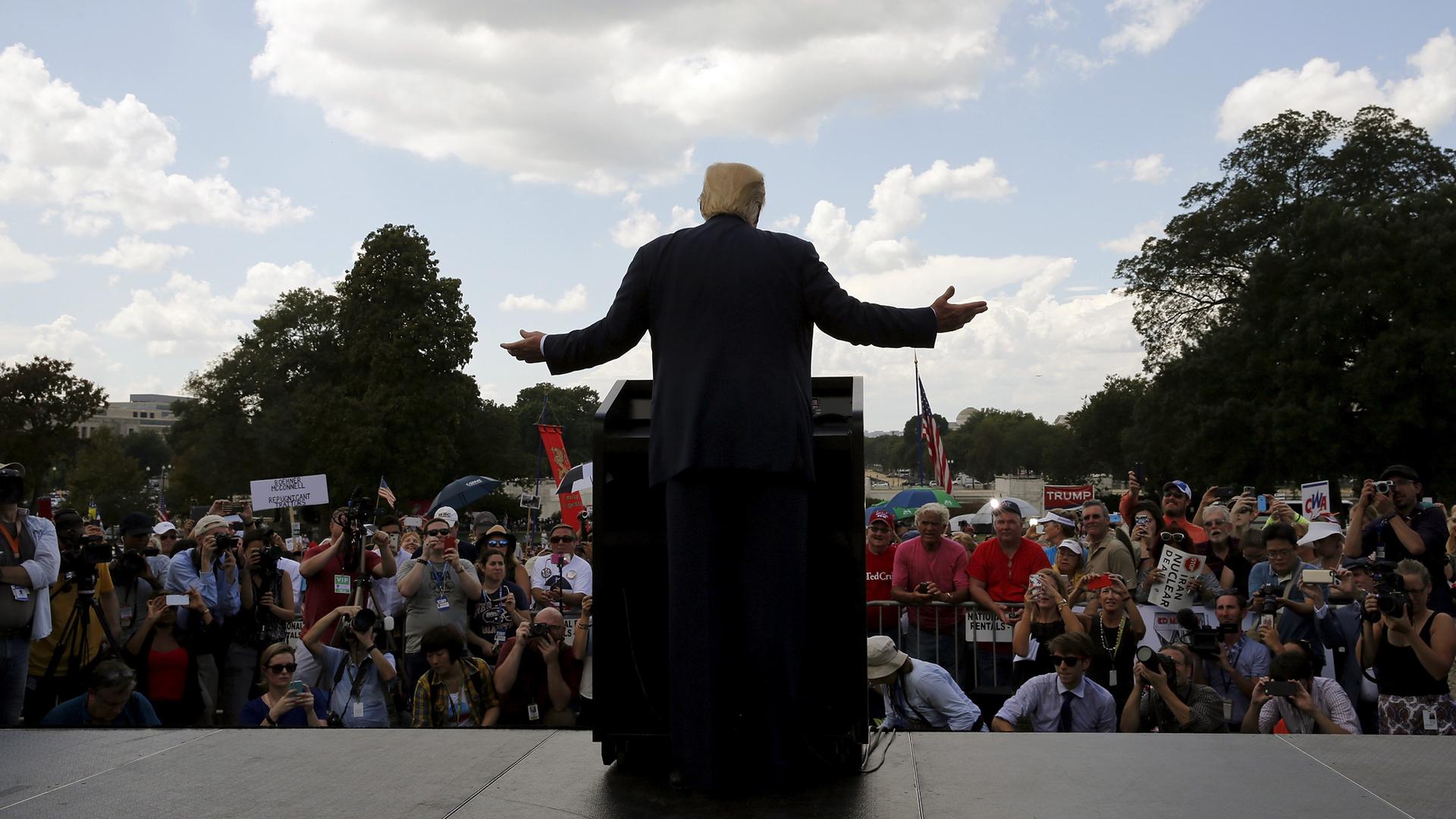North Korea looms large as Trump challenges Iran
Then Republican presidential candidate Donald Trump addressing a Tea Party rally against the Iran nuclear deal in Washington, 2015.
By the close of business Friday, President Donald Trump is expected to declare that a landmark agreement curbing Iran's nuclear program is no longer in the US interest. But, the White House has come to see a rapidly escalating standoff with North Korea as a complicating factor.
That would not kill the deal outright, but it would pass that decision on to Congress — a gambit full of risk for the greater Middle East.
During months of debate about regional repercussions from Aden to Kabul, indeed, since the hours after Trump was elected, a gathering storm with North Korea has weighed heavily.
Trump has repeatedly dismissed the Iran nuclear accord as terrible for America, as he prepares to announce whether to certify Iran's compliance with it.
"This is the worst deal. We got nothing," Trump told Fox News in reference to the 2015 accord negotiated with Iran by the United States and five other world powers.
The weight of office
When Trump met president Barack Obama for the first time on November 10, 2016, the outgoing leader had an ominous warning for the president elect.
Sitting feet from each other in the storied Oval Office, Obama told Trump he would face a fateful decision on North Korea in the first months of his presidency.
Trump would have to decide whether to allow Kim Jong-un to develop the capability to nuke almost any city in the continental United States.
Presidents from Obama back to George Bush Sr. had tried inducements and coercion to prevent North Korea from breaking through a series of ominous proliferation thresholds.
But year after year, as the Kim dynasty passed through three generations, North Korea marched ever closer to mastering what Winston Churchill once called the "lights of perverted science."
Pyongyang covertly separated plutonium, withdrew from the nuclear non-proliferation treaty, and developed a medium-range ballistic missile that could hit Alaska or Hawaii. It perfected an atomic bomb.
By November 2016, US intelligence believed that Pyongyang would — in a matter of months rather than years — be able to marry intercontinental ballistic missile technology with the ability to produce a miniaturized thermonuclear device, putting the United States within reach.
The United States had three basic choices: Military action, diplomacy or acceptance.
According to aides familiar with the Oval Office conversation last November, Obama felt he had conveyed the gravity of the situation to the incoming president.
Trump came away feeling like such a serious a situation should have been dealt with long ago.
"Look, this should have been taken care of by four or five previous administrations," Trump told Forbes recently. "I feel strongly you cannot allow him to have nuclear weapons."
Under Trump's tough-guy doctrine, an unbending message to Iran would make North Korea take notice.
But several White House officials described the choice in more historical terms.
They have come to believe that tackling Iran today offers an opportunity akin to that which was squandered with North Korea a decade or more ago.
Getting tough on Tehran, they argue, affords Trump a chance to prevent a foe from developing nuclear weapons and jamming the next president with a litany of bad choices.
Walking away from talking?
Proponents of the deal argue there is no evidence Tehran is breaching the deal, so it remains the best way to prevent an Iranian bomb.
For them too, North Korea looms large.
"There would be no more crippling a blow to the prospects for a peaceful outcome with North Korea than walking away from the Iran deal," Ned Price, a spokesman for Obama's National Security Council who spent a decade at the CIA, recently wrote.
They argue that Washington's willingness to risk an agreement it signed barely two years ago — which Iran seems to be adhering to — and which is still strongly supported by longstanding European allies, sends a terrible message to Pyongyang.
One of the deal's diplomat-architects, Wendy Sherman, argued North Korea would conclude it is futile to talk to Washington.
"We are likely to lose any possibility of dialogue with North Korea because Pyongyang will assume the United States will not honor its commitments, even on multilateral agreements," she wrote.
Whether supporters of the Iran deal or its detractors are correct, Trump's decision looks set to reverberate beyond the Middle East and all the way to the Korean Peninsula.
by Andrew Beatty/AFP
Our coverage reaches millions each week, but only a small fraction of listeners contribute to sustain our program. We still need 224 more people to donate $100 or $10/monthly to unlock our $67,000 match. Will you help us get there today?
